New Organic Waste Recycling Program
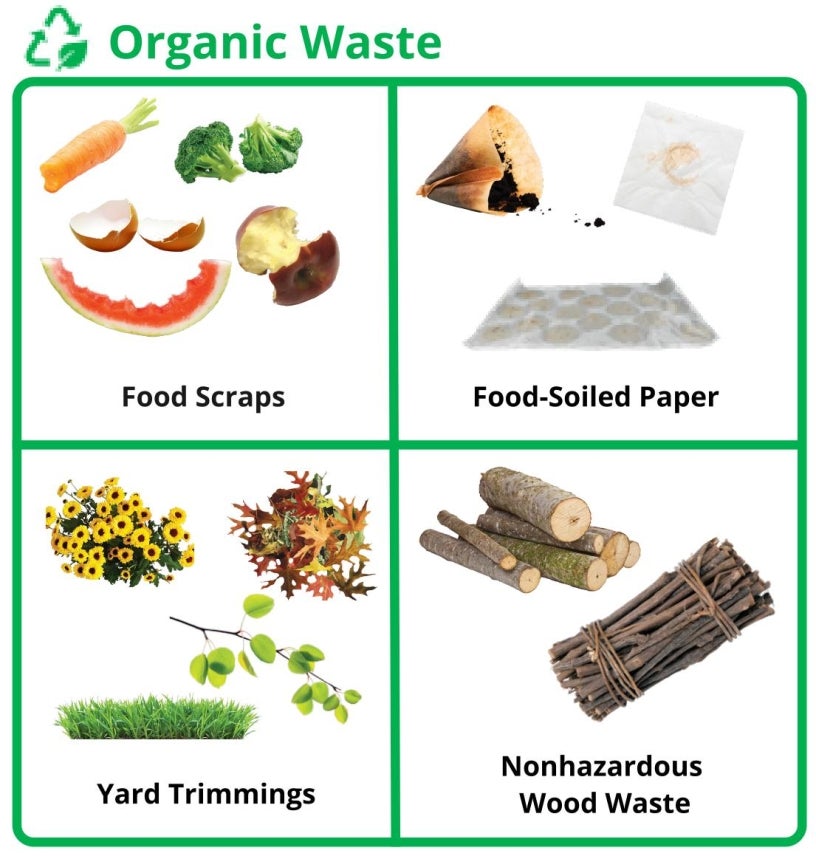 California State Senate Bill 1383 (SB 1383), requires the reduction of organic waste disposed of in landfills. Organic waste is food scraps and food-soiled paper from kitchens and food operations, and yard waste such as garden and landscape waste and wood waste.
California State Senate Bill 1383 (SB 1383), requires the reduction of organic waste disposed of in landfills. Organic waste is food scraps and food-soiled paper from kitchens and food operations, and yard waste such as garden and landscape waste and wood waste.
In order to comply with SB 1383 and make San Diego a more sustainable and thriving place for everyone, the City of San Diego is pleased to introduce a new Organic Waste Recycling program for all City residents. The program—which represents the biggest change to trash and recycling in San Diego’s history—supports the City’s Zero Waste and Climate Action Plan goals.
For information about organic waste recycling, what items can go in the new green bin, and other vital details, please refer to the Organic Waste Recycling Frequently Asked Questions page.
Reason for Changes
According to the Environmental Protection Agency, organic waste accounts for a significant portion of California’s waste stream. Left to decompose in landfills, the organic waste releases methane, a gas that traps the sun’s heat, warms the atmosphere and contributes to climate change. Organic waste in landfills also emits air pollutants such as fine particulate matter (PM 2.5), contributing to health conditions like asthma. To address this issue, Senate Bill 1383 was signed into law and targets the reduction of pollutants, including methane. Cities throughout California must meet the new reduction limits through organic waste reduction and recycling.
Collection and Recycling
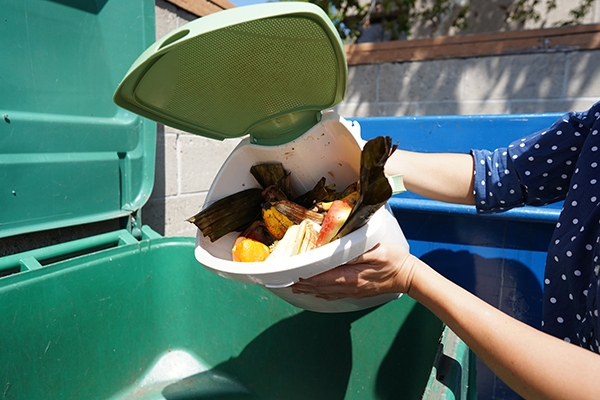
Implementing Senate Bill 1383 requires extensive procedural changes and significant coordination. The City of San Diego has updated collection operations, amended agreements with non-exclusive franchise haulers, amended the City’s Municipal Code and provided outreach and education to residents and businesses that will continue into the future. Participation in this exciting new organic waste recycling program is vital to San Diego's future.
Food and yard waste collected is recycled using:
- Composting facilities that make soil amendments, materials that are added to soil to change and improve it.
- Anaerobic digestion facilities, technology and microorganisms break down organic waste in closed spaces without oxygen and create renewable natural gas.
Homes Serviced by the City
The City of San Diego proudly maintains weekly Organic Waste Recycling collection services.
- Kitchen pails have been delivered to all City-serviced residences.
- Green bins have been delivered to City-serviced residences that have not previously been provided with a green bin.
- Each City-serviced household can make a big difference for the environment by collecting organic waste, discarding the contents into the green bin, and setting the green bin out for weekly collection at their normal trash collection location.
- Additional green bins can be requested. Bin options are 35-gallon, 65-gallon and 95-gallon.
- All bin requests can be made on the Get It Done app at sandiego.gov/get-it-done or by calling 858-694-7000.
Helpful Resources For Successful Use of Your Green Bin and Kitchen Pail
Curbside Organic Waste Recycling Guide
Organic Waste Recycling Steps
Clean Bin Tips
- Helpful tips to prevent any odors or buildup in the green bin can be found here.
Businesses and Multifamily Serviced by a Private Hauler
Organic waste recycling options for businesses and multifamily apartments and condominiums serviced by a private hauler:
- Contact City-approved franchise haulers or certified recyclers to request organic waste recycling containers and service needs.
- Contract with a gardening or landscaping service provider to the self-haul yard and landscape trimmings and nonhazardous wood waste off your property.nk is external)
City staff can provide helpful tips and technical assistance for successfully setting up organic waste recycling at your site. Please contact sdrecyclingworks@sandiego.gov or 858-694-7000.
Please visit the City Recycling Ordinance page for detailed information on complying with the organic waste recycling requirements.
 Food Waste Prevention and Reduction
Food Waste Prevention and Reduction
These downloadable and printable guides provide tips on preventing food waste in both commercial and residential kitchens.
Commercial Food Waste Prevention
Food Storage Best Practices
Date Labels Explained
Freezer-Friendly Food Tips
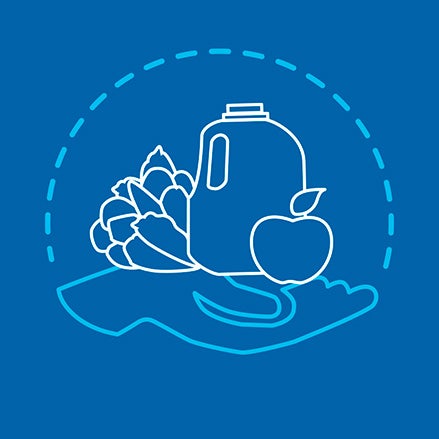 Food Recovery Organizations and Services
Food Recovery Organizations and Services
Food Recovery Organizations
Food recovery organizations and services that receive and collect excess edible food (that would otherwise be disposed of) from commercial edible food generators are subject to recordkeeping, reporting and outreach requirements as outlined in the Recycling Ordinance. Find the details of these designations and their corresponding requirements below:
Food Recovery Organizations: groups collecting or receiving edible food from commercial edible food generators with a written food recovery agreement.
Food Recovery Services: groups collecting and transporting edible food from commercial edible food generators with a written food recovery agreement. (Food recovery services transport food to food recovery organizations).
Annual Reporting Form
Annual reports are for the period of Jan. 1 - Dec. 31 and are due on Jan. 31 of each year, commencing in 2023.
Food Recovery Organization Reporting Form
Requirements for Food Recovery Organizations
- Maintain records of the following for each commercial edible food generator from which the organization receives edible food:
- Name
- Address
- Contact information
- Pounds per month of edible food received
- Maintain records of the following for each food recovery service from which the organization receives edible food:
- Name
- Address
- Contact information
- Submit an annual report to the City of San Diego Environmental Services Department by Jan. 31 of each year with the above information, including the quantities of edible food received reported in pounds per year (see reporting form below).
- Provide written information on California and Federal Good Samaritan Food Donation Act protection to commercial edible food generators from which the Organization collects edible food.
Requirements for Food Recovery Services
- Maintain records of the following for each commercial edible food generator from which the service collects edible food:
- Name
- Address
- Contact information
- Pounds per month of edible food collected
- Maintain records of the following for each food recovery organization to which the service transports edible food
- Name
- Address
- Contact information
- Pounds per month of edible food transported
- Submit an annual report to the City of San Diego Environmental Services Department by Jan. 31 of each year with the information above, including the quantities of edible food collected and transported reported in pounds per year (see reporting form below).
- Provide written information on California and Federal Good Samaritan Food Donation Act protection to commercial edible food generators from which the Service collects edible food.
Additional Resources for Food Recovery Organizations and Services:
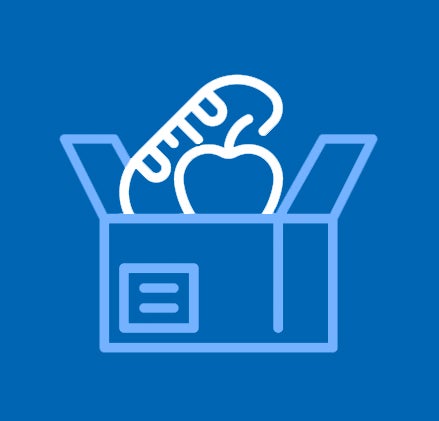 Edible Food Recovery from Businesses
Edible Food Recovery from Businesses
California is working toward a 2025 goal to redirect and donate 20% of edible food to those in need. SB 1383 categorizes regulated food donors into two tiers that must start donating surplus edible food in 2022 and 2024 to food recovery organizations.
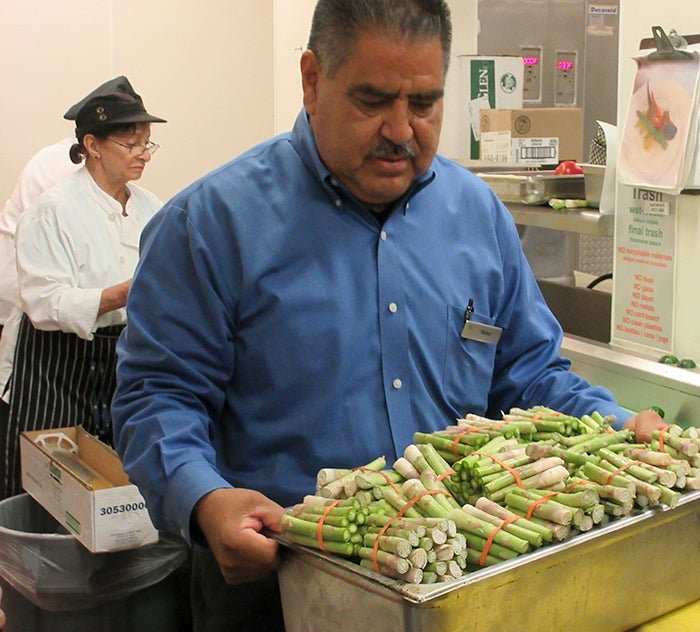
Commercial Edible Food Generators
Tier One Businesses - Effective Jan. 1, 2022
- Supermarkets with gross annual sales of $200,000 or more
- Grocery Stores with a facility size of 10,000 square feet or more
- Food Service Providers
- Food Distributors
- Wholesale Food Vendors
Tier Two Businesses - Effective January 1, 2024
- Restaurants with 250 or more seats, or a total facility size equal to or greater than 5,000 square feet
- Hotel with an on-site food facility and 200 or more rooms
- Health facility with an on-site food facility and 100 or more beds
- Large venue
- Large event
- A state agency with a cafeteria with 250 or more seats or a total cafeteria facility size equal to or greater than 5,000 square feet
- A local education agency with an on-site food facility
Additional Resources for Commercial Edible Food Generators:
- Food Recovery Frequently Asked Questions (FAQs)
- Food Recovery Organization List – City of San Diego
- 2025 Food Recovery Requirements for Tier One Businesses - English
- 2022 Requisitos para la recuperación de alimentos para los negocios de Primer Nivel - Spanish/Español
- 2022 Mga kinakailangan sa pagbabawi ng pagkain para sa mga negosyong Tier One- Tagalog
- Các yêu cầu về thu hồi thực phẩm đối với các doanh nghiệp Cấp Một năm 2022 - Vietnamese/Tiếng Việt
- 2025 Food Recovery Requirements for Tier Two Businesses - English
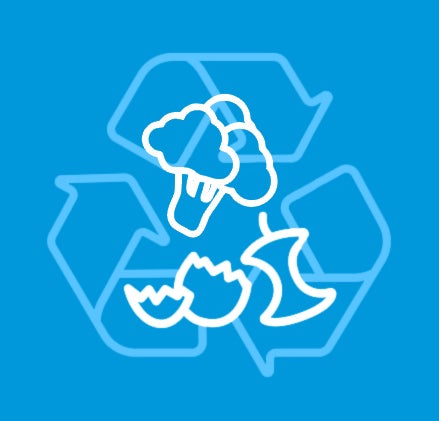 Collection and Organic Waste Recycling Services, Signs and Education Handouts
Collection and Organic Waste Recycling Services, Signs and Education Handouts
Organic Waste Recycling Services
- Organic waste recycling collection - Approved hauler list for businesses and multifamily properties with private hauler service
- Facility list for self-haul drop-off to recycle yard waste and nonhazardous wood for mulching or composting
- Community composting drop-off sites
Signage
If you're serviced by a private waste hauler, they can also provide signs for your property.
Organic Waste Recycle Sign
- Letrero de reciclaje de residuos orgánicos (English and español)
- Sign ng pagre-recycle ng organikong basura (English and Tagalog)
- Dấu hiệu tái chế rác hữu cơ (English and Vietnamese)
Recycle Sign
- Letrero de reciclaje (English and español)
- Sign mag-recycle (English and Tagalog)
- Dấu hiệu tái chế (English and Vietnamese)
Landfill Trash Sign
- Letrero de basura (English and español)
- Sign para sa basura (English and Tagalog)
- Dấu hiệu thùng rác (English and Vietnamese)
Education Handouts
- SB 1383 overview handout - For commercial businesses (English and español)
- SB 1383 overview handout - For multifamily apartment and condo owners and managers to provide to residents (English and español)
Need More Help?
For more information and assistance, contact the Environmental Services Department at sdrecyclingworks@sandiego.gov or 858-694-7000. For program updates, please continue to check this page.
Visit CalRecycle to learn more about the statewide SB 1383 organic waste recycling and edible food recovery requirements.

